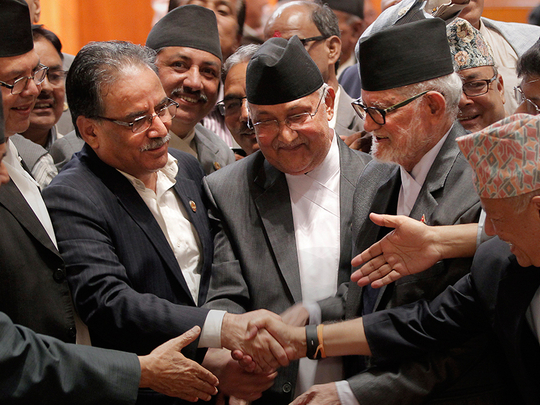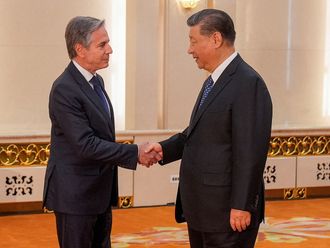
Kathmandu: Nepal’s parliament is set Sunday to choose a new prime minister tasked with unifying the quake-hit country after the adoption of a new constitution triggered deadly protests and a border blockade.
KP Sharma Oli of the Communist Party of Nepal (Unified Marxist Leninist) is favoured for the top job over Sushil Koirala, who stepped down as premier as required by the constitution adopted on September 24.
The new prime minister will have to quell continuing protests over the new constitution and end the blockade which has led to nationwide fuel rationing, as well as push ahead with reconstruction after the devastating earthquake in April.
“My request is that all the parties must work together and move forward in consensus,” Oli told lawmakers in an address to parliament before the vote.
“There are groups that are dissatisfied with the constitution, we have to address their demands,” said Oli, who needs a simple majority of 299 votes in the 598-member parliament to win.
“Our country has been devastated by the earthquake. I will accelerate the reconstruction process,” he also said.
The current government faces accusations of stalling on rebuilding since the quake that killed nearly 8,900 people and left more than half a million homeless.
The constitution is aimed at bolstering the Himalayan country’s transformation to a peaceful democracy after decades of political instability and a civil war.
The main political parties were spurred into agreeing on the charter, after years of bickering, following the earthquake.
But the charter, the first to be drawn up by elected representatives, triggered a blockade by protesters at a vital border checkpoint, cutting off fuel supplies from India and sparking a nationwide shortage.
Protesters from Nepal’s southern plains are incensed about the charter, which will divide the country into several federal provinces.
More than 40 people have been killed in clashes between police and protesters representing ethnic minorities, who say the new federal structure will leave them under-represented in parliament.
The historically marginalised groups include the Madhesi and Tharu minorities who mainly inhabit the southern plains, along the border with India.
The constitution is the final stage in a peace process that began when Maoist fighters laid down their arms in 2006 after a decade-long insurgency aimed at abolishing an autocratic monarchy and creating a more equal society.
“There are enormous challenges for the new prime minister. The public will also have high expectations. He will have to resolve the crisis the country is facing,” Ameet Dhakal, editor in chief of online news portal Sepopati, told AFP.
“So far it looks like Oli has the majority backing in the parliament, but it is hard to predict in politics,” Dhakal said.
The new prime minister will also have to mend ties with giant influential neighbour India which, worried about instability on the border, has expressed concerns over the constitution.
Nepali politicians have even accused India of being behind the blockade that started on September 24 to protest against the charter.
As trucks remain stuck at the border, Nepal has been forced to ration supplies nationwide as long lines form at petrol stations.
India, which supplies all fuel to landlocked Nepal, has denied involvement in the blockade and instead urged all parties to enter talks to resolve the crisis.
—AFP












